- Administrator
- Albums and Singles
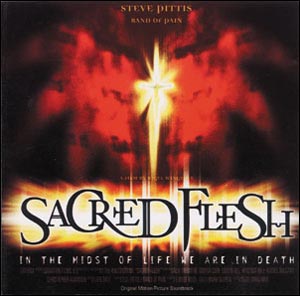
Artist: Band Of Pain
Title: Sacred Flesh O.S.T.
Catalogue No: CSR33CD
Barcode: 0 1753326192 1
Format: CD in jewelcase
Genre: Dark Ambient / Black Ambient / Soundtrack
Shipping: Now
10 Year Anniversary reissue. Ltd x 666 copies only!
The soundtrack was written by Band Of Pain (aka Steve Pittis, ex-Splintered), creating a very dark, brooding atmosphere to compliment Nigel Wingroves' film. Sacred Flesh is dark journey into realms of mental anguish and repression; a very Black Ambient soundtrack. This is Band Of Pain working in the medium to which it is most suited. A incredible album with massive demand from both film and music distributors alike.
Tracks: 1. Sacred Flesh | 2. Elizabeth, Bride Of Christ | 3. Strength To Resist | 4. Submission | 5. In Media Vita | 6. Beat Out Desire | 7. Sacred Flesh - Full Extended Version | 8. The Ambush | 9. The Cell | 10. Sister Ann | 11. Sacred Erosion | 12. Revelations
Read More
- Administrator
- Albums and Singles
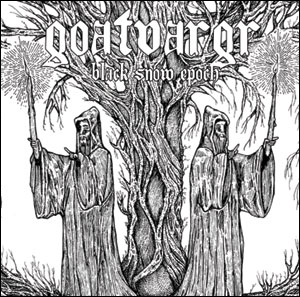
Artist: Goatvargr
Title: Black Snow Epoch
Catalogue No: CSR126CD
Barcode: 8 2356649882 7
Format: CD in jewelcase with poster cover
Genre: Black Industrial / Power Noise
Shipping: Now
The second unholy union of Lord Nordvargr (MZ.412, Folkstorm, Toroidh etc) and Goat (USA). Time, pilgrimages and bloodlines have been bourn since the first testament of Goatvargr was witnessed in this era of false knowledge. The first covenant of Goatvargr was baleful, lycanthropic and lethiferous. A rejection of the techgnostic kingdom and circuitry idols which seduce our era. The downfall of light has brought a world of coldness. This Black Snow Epoch is a time to honour our forbearers such as MZ.412 and the elements of flesh, wood and alchemical steel. Industrial loops and analogue keyboards merge with sheet metal and chains to create a solemn winter hymn where the cold steel stings your flesh. The wolf instinctively hunts through the frost, and the goat is blamed for human transgressions, yet during the Black Snow Epoch, the true hunters will pursue.
Tracks: 1. Goatsbane / Scapewolf | 2. Bearer, Begetter, The Sovereign Wolf | 3. Dark Eyed And Frost Scorned | 4. Goatwalking | 5. Razed Under Cloven Hoof And Bloody Maw | 6. Wall Of Goat | 7. Wall Of Wolf | 8. A Black Drum Droning
Read More
- Administrator
- Albums and Singles

Artist: Fire In The Head
Title: Confessions Of A Narcissist
Catalogue No: CSR120CD
Barcode: 8 2356649912 1
Format: CD in jewelcase
Genre: Power Electronics
Shipping: Now
"Confessions Of A Narcissist" marks the final full-length release by Fire In The Head ending six years of sonic warfare with an assault of manic, self-indulgent industrial electronics. Drawing as much influence from early punk / hardcore as from industrial / power electronics, F/I/T/H was conceived as a cathartic outlet to explore and ratify the delusions and social perversions resultant of psychosis and the darker side of man's conflicted dual nature, to fan the flames which engulf the borders between obsession, compulsion, lust and need. The tracks on this release were recorded in 2007-2008 and are the last of the "short, sharp, shock" vocal tracks which Michael abandoned in favour of "epic" length industrial / ambient compositions. Features guest appearances from Nick Blinko (Rudimentary Peni) and J. Randall (Agoraphobic Nosebleed), with exclusive artwork from Blinko. Stickered for stores.
Tracks: 1. Gag Order | 2. I'm Not Here To Coexist, I'm Here To Win | 3. Home Is Where The Whore Is | 4. Psychotic Underground Mk. II | 5. Get The Rope | 6. Narcissist's Mantra | 7. A Means To What End | 8. The Machinery Of Death | 9. Home Invasion | 10. Complacency Is Your Disgrace | 11. The Magi | 12. Some Dreams Last Forever | 13. Gag Order (Choked Again)
Read More
- Administrator
- Albums and Singles
 In addition to being the first non-Matmos release to surface on Martin Schmidt and Drew Daniel's Vague Terrain label, Unseen Forcesis also the debut release for the San Francisco audiovisual supergroupSagan. While an increasing number of electronic and experimentalartists are defining themselves as "audiovisual," Sagan is one of thefew I've encountered that have released the visual component of theirwork simultaneously to the audio component, thereby assuring that anaudience, beyond those who see a live performance, will be able toexperience their work in a proper context. The group is comprised ofelectronic heavyweights J. Lesser, Blevin Blectum, Jon Leidecker (AKAWobbly) and video artist Ryan Junell. It's an ambitious project thatpays homage to the late Carl Sagan, popular scientist, astronomer, andthe turtlenecked host of the seminal PBS series Cosmos. In wayof tribute to this looming hero of nerds, Sagan the group offers anhour-long excursion into the far-flung realms of the universe,eschewing the kind of glitched-up laptop pranks we might have expectedfrom these three, in favor of an unexpectedly cosmic amalgam ofanalogue synthesizers, field recordings and sample-driven electronica.The three musicians throw everything including the kitchen sink intothese twelve tracks, but somehow distill and process their many inputsinto a cohesive work that cannot be easily compared to anything thathas come before. The press notes try to make the case for a comparisonto 70s kosmische rockers Hawkwind and Vangelis, and while thoseinfluences are certainly present, it's a misleading way to characterizethe sounds on Unseen Forces. In the span of seven minutes,Sagan travel from windswept ambient spacescapes to crunchy rhythms andsquelching computer glitches; from a Gyorgi Ligeti choir of ghostlyvoices to sudden blasts of heavy metal guitar; from shuddering,synth-heavy science-class filmstrips to a jungle full of screechingmonkeys and cawing birds; from Middle Eastern breaks todigitally-obliterated gabbercore trance and subtle atmospheric passagesof tinkling piano. It may sound like a recipe for short-attention-spandilettantism or plunderphonia, but it's actually remarkably focused,and remains very much on the theme of science and that essential aweand wonder inherent in the infinite possibilities of the universe. Asentertaining as the music can be at times, it works even better incontext with the 40-minute video included on the DVD. In a series ofsilly-to-brilliant Viewmaster slide sketches, video artist Ryan Junellilluminates important scientific disoveries. In one of the openingsketches, a vivid illustration of the Big Bang is performed in front ofaudience by a group of flashlight-wielding astronomy enthusiasts in adark room. In the next sketch, M.C. Schmidt and Drew Daniel of Matmosreenact Pausianus' discovery of air as a substance, doubling as a gaypick-up scene in an ice cream parlor. I learned about the contentiouspartnership of early astronomers Tyco Brahe and Johannes Kepler in avery funny sketch involving quiche and a gold-plated nose. In anothermemorable sketch, Lesser and Blectum portray Pierre and Marie Curie,discovering radiation as well as their love for each other. The DVDalso includes six hours of MP3 audio, documenting Sagan's liveperformances. I'm very impressed by the amount of work put into thispackage, and the artists' genuine love and reverence for Carl Sagan andhis beloved scientific method is definitely contagious. It very nearlyqualifies as educational material, on a par with Charles and Ray Eames'The Powers of Ten, or anything that is genuinely able to make learning fun.
In addition to being the first non-Matmos release to surface on Martin Schmidt and Drew Daniel's Vague Terrain label, Unseen Forcesis also the debut release for the San Francisco audiovisual supergroupSagan. While an increasing number of electronic and experimentalartists are defining themselves as "audiovisual," Sagan is one of thefew I've encountered that have released the visual component of theirwork simultaneously to the audio component, thereby assuring that anaudience, beyond those who see a live performance, will be able toexperience their work in a proper context. The group is comprised ofelectronic heavyweights J. Lesser, Blevin Blectum, Jon Leidecker (AKAWobbly) and video artist Ryan Junell. It's an ambitious project thatpays homage to the late Carl Sagan, popular scientist, astronomer, andthe turtlenecked host of the seminal PBS series Cosmos. In wayof tribute to this looming hero of nerds, Sagan the group offers anhour-long excursion into the far-flung realms of the universe,eschewing the kind of glitched-up laptop pranks we might have expectedfrom these three, in favor of an unexpectedly cosmic amalgam ofanalogue synthesizers, field recordings and sample-driven electronica.The three musicians throw everything including the kitchen sink intothese twelve tracks, but somehow distill and process their many inputsinto a cohesive work that cannot be easily compared to anything thathas come before. The press notes try to make the case for a comparisonto 70s kosmische rockers Hawkwind and Vangelis, and while thoseinfluences are certainly present, it's a misleading way to characterizethe sounds on Unseen Forces. In the span of seven minutes,Sagan travel from windswept ambient spacescapes to crunchy rhythms andsquelching computer glitches; from a Gyorgi Ligeti choir of ghostlyvoices to sudden blasts of heavy metal guitar; from shuddering,synth-heavy science-class filmstrips to a jungle full of screechingmonkeys and cawing birds; from Middle Eastern breaks todigitally-obliterated gabbercore trance and subtle atmospheric passagesof tinkling piano. It may sound like a recipe for short-attention-spandilettantism or plunderphonia, but it's actually remarkably focused,and remains very much on the theme of science and that essential aweand wonder inherent in the infinite possibilities of the universe. Asentertaining as the music can be at times, it works even better incontext with the 40-minute video included on the DVD. In a series ofsilly-to-brilliant Viewmaster slide sketches, video artist Ryan Junellilluminates important scientific disoveries. In one of the openingsketches, a vivid illustration of the Big Bang is performed in front ofaudience by a group of flashlight-wielding astronomy enthusiasts in adark room. In the next sketch, M.C. Schmidt and Drew Daniel of Matmosreenact Pausianus' discovery of air as a substance, doubling as a gaypick-up scene in an ice cream parlor. I learned about the contentiouspartnership of early astronomers Tyco Brahe and Johannes Kepler in avery funny sketch involving quiche and a gold-plated nose. In anothermemorable sketch, Lesser and Blectum portray Pierre and Marie Curie,discovering radiation as well as their love for each other. The DVDalso includes six hours of MP3 audio, documenting Sagan's liveperformances. I'm very impressed by the amount of work put into thispackage, and the artists' genuine love and reverence for Carl Sagan andhis beloved scientific method is definitely contagious. It very nearlyqualifies as educational material, on a par with Charles and Ray Eames'The Powers of Ten, or anything that is genuinely able to make learning fun. - Theme From "Unseen Forces"
- JabPunPlus (ONEPLUSTWO)
- Eyes Fixed in Wonderment Upon the End of the Cosmic Calendar
Read More
- Administrator
- Albums and Singles
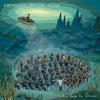 American Music Club triumphantly return after ten years of absence. Foranybody not in-the-know, AMC is much more than Mark Eitzel's piercinglyrics and bleeding vocals: it's Vudi's chaotic guitar, Danny Pearson'sthree-string bass and simultaneous percussive playing acrobatics, TimMooney's shuffling rhtyhms, and Bruce Kaphan's pedal steel and piano(replaced this time around with lap steel by Vudi and piano by newmember Marc Capelle). While Eitzel has recorded and performed solo forthe last ten years, the perfectly paired sounds of the group with hisvoice—the disorder, discomfort, and awe-inspiring beauty—has been sadlymissed. These are sounds of a group which has been such a largeinfluence to so criminally few people. With 1991's Everclear,AMC perhaps recorded their first perfect album, flawless and intense,(conincidentally released at the time I discovered hard liquor!). Theyupped the stakes with 1993's Mercury, a bold album of theirbrand of slow yet raw tunes where the group experimented with new waysof composing and recording, all of which fit into a perfect mix. Ofcourse, for their Warner Bros. bosses, it wasn't enough, and I'm surethe pressure was on for them to have a "hit single." 1994's San Franciscowas probably their most sonically digestible album, primed for popradio, but it didn't feel like everybody was quite on board. Inretrospect, it's no surprise Eitzel was probably frustrated, called ita day, fired everybody, and went solo. Love Songs for Patriotsopens with Eitzel's voice front stage center, with the familiar soundof AMC's past blasting through like an unstoppable train that'sexploded in a tunnel as the smoke and fire move through, ready to comeout the other end, faster and hotter. The gentle songs like "AnotherMorning," "Love Is," and especially "Myopic Books" are excellentbreathers: sweet, gentle, sandwiched in between the rough and loudsongs, and echo fan favorites like "Last Harbor" and "Jenny."Content-wise, Eitzel's lyrics are as brilliant as they have ever been,with new stories about love and god, almost entirely void of rhymescheme, and requiring intense group therapy for any listener who'sactually paying attention. It's for his lyrics alone that make AMC andEitzel a terrible band to listen to in the car, as a driver needs to bepaying attention to the road, not the male stripper with underwear fullof George Washingtons, the star of the brilliant tune "Patriot'sHeart," or Mark's mom who likes Manhattans, which he says "taste likemouthwash." (Even Kathleen makes her way onto this record!) Like Coilonce were encouraging "deep listening" to delicately layeredinstrumental music, American Music Club is "deep listening" for lyricalcontent, super soaked in emotion with obscure references to reitred popicons, the bible, and idealized Americana. Eitzel is equal parts dramaand comedy and only with AMC do I feel he's truly meeting his match atthe same time, all the time. I look forward to their upcoming tour andhope this isn't just a one-off reunion, as AMC is one of the mostinfluential bands to my own musical taste evolution and maturation.
American Music Club triumphantly return after ten years of absence. Foranybody not in-the-know, AMC is much more than Mark Eitzel's piercinglyrics and bleeding vocals: it's Vudi's chaotic guitar, Danny Pearson'sthree-string bass and simultaneous percussive playing acrobatics, TimMooney's shuffling rhtyhms, and Bruce Kaphan's pedal steel and piano(replaced this time around with lap steel by Vudi and piano by newmember Marc Capelle). While Eitzel has recorded and performed solo forthe last ten years, the perfectly paired sounds of the group with hisvoice—the disorder, discomfort, and awe-inspiring beauty—has been sadlymissed. These are sounds of a group which has been such a largeinfluence to so criminally few people. With 1991's Everclear,AMC perhaps recorded their first perfect album, flawless and intense,(conincidentally released at the time I discovered hard liquor!). Theyupped the stakes with 1993's Mercury, a bold album of theirbrand of slow yet raw tunes where the group experimented with new waysof composing and recording, all of which fit into a perfect mix. Ofcourse, for their Warner Bros. bosses, it wasn't enough, and I'm surethe pressure was on for them to have a "hit single." 1994's San Franciscowas probably their most sonically digestible album, primed for popradio, but it didn't feel like everybody was quite on board. Inretrospect, it's no surprise Eitzel was probably frustrated, called ita day, fired everybody, and went solo. Love Songs for Patriotsopens with Eitzel's voice front stage center, with the familiar soundof AMC's past blasting through like an unstoppable train that'sexploded in a tunnel as the smoke and fire move through, ready to comeout the other end, faster and hotter. The gentle songs like "AnotherMorning," "Love Is," and especially "Myopic Books" are excellentbreathers: sweet, gentle, sandwiched in between the rough and loudsongs, and echo fan favorites like "Last Harbor" and "Jenny."Content-wise, Eitzel's lyrics are as brilliant as they have ever been,with new stories about love and god, almost entirely void of rhymescheme, and requiring intense group therapy for any listener who'sactually paying attention. It's for his lyrics alone that make AMC andEitzel a terrible band to listen to in the car, as a driver needs to bepaying attention to the road, not the male stripper with underwear fullof George Washingtons, the star of the brilliant tune "Patriot'sHeart," or Mark's mom who likes Manhattans, which he says "taste likemouthwash." (Even Kathleen makes her way onto this record!) Like Coilonce were encouraging "deep listening" to delicately layeredinstrumental music, American Music Club is "deep listening" for lyricalcontent, super soaked in emotion with obscure references to reitred popicons, the bible, and idealized Americana. Eitzel is equal parts dramaand comedy and only with AMC do I feel he's truly meeting his match atthe same time, all the time. I look forward to their upcoming tour andhope this isn't just a one-off reunion, as AMC is one of the mostinfluential bands to my own musical taste evolution and maturation. Read More
- Administrator
- Albums and Singles
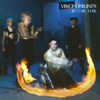 Though it was never recognized as such in its own time, the Virgin Prunes' 1982 debut ...If I Die, I Die truly represented a creative apex of gothic rock. Retrospectively, it's difficult to think of another album that more effectively channeled the decadent perversity, outlandish freakiness and theatrical melodrama that characterized the movement, while avoiding the pitfalls of overwrought self-parody and puerility.
Though it was never recognized as such in its own time, the Virgin Prunes' 1982 debut ...If I Die, I Die truly represented a creative apex of gothic rock. Retrospectively, it's difficult to think of another album that more effectively channeled the decadent perversity, outlandish freakiness and theatrical melodrama that characterized the movement, while avoiding the pitfalls of overwrought self-parody and puerility.
Even other more widely acknowledged classics of gothic post-punk, such as Bauhaus' In the Flat Field, can't match the intensity and single-mindedness of ...If I Die, I Die. The album was produced by Colin Newman of Wire, who seems to have allowed the Prunes' own flamboyant aesthetic to shine through strongly, even while skillfully streamlining their sound and reigning in some of the band's more experimental tendencies. But Newman knew a good thing when he heard it, highlighting the fascinating interplay of the band's three vocalists—Gavin, Guggi and Dave-id—whose menacing voices intertwine and overlap to frequently hair-raising effect. Virgin Prunes' penchant for tribal jackhammer percussion, gloomy bass melodies and spidery guitar figures are in full evidence on the album, and are given a substantial boost by the fine remastering job on this Mute reissue. The packaging has also been given a makeover, with new cover art showing the band in their full costumed glory, and a lyric booklet with further photographic evidence of the Prunes' peculiar style, a combination of glam cover-models and pagan wood-nymphs. The album is loaded with terrifically intense performances to match the band's baroque aesthetic, most notably in the snarling triple-vocal assaults of classics like "Sweethome Under White Clouds" and "Baby Turns Blue." Newman's unorthodox production is positively teeming with atmospheric touches on tracks like "Bau-Dachong," named in the Prunes' invented language of Bo-Prune. Jagged guitar chords and violent drumming propels songs like "Walls of Jericho" into a bleak, claustrophobic atmosphere, even as the singalong chorus pushes the song into poppy territory. Most tracks walk a fine line between dissonance and focus, but occasionally, as on "Caucasian Walk," the band digresses into unhinged chaos. "Ballad of the Man" seemed like the most embarassingly dated of the album's songs, until I realized that it was actually a brutal style-parody of Bruce Springsteen, inverting the Boss' working-class hero mythology to spin a satirical tale about a bank robber. The Prunes' save the weirdest material for the end of the album, with the bizarre "Chance of a Lifetime" and "Yeo," both utilizing reverb and phasing to eerie psychedelic effect, and the latter an inexplicable sequence of vocal intonations and piano melodies being played in a rainstorm. ...If I Die, I Die might not be the most adventurous album of the Virgin Prunes' career, but its certainly the most focused, and a remarkably fierce statement of artistic integrity.
Read More
- Administrator
- Albums and Singles
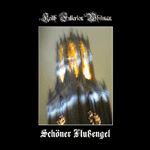 There's something new churning inside the supernatural bones of thesesongs. The world of instrumental evolution and ultra-processed sound isripe with abrasiveness and cosmic dust. While most of what KeithFullerton Whitman releases under his own name is numinous and hazy,there's an extra dose of the dark and unfathomable on Schöner Flußengel. Bits and pieces of Antithesisremain on this record; the album moves via the progression of obviousinstrumentation and recognizable musical elements. The record floats,however, in a way that its predecessor did not. Whitman's melodicmovements are seemingly circular and they build a labyrinthinestructure that lacks no amount of intimidation. "Lixus (VersionAnalogique)" opens the album with the ghastly moan of cymbalsscratching against each other, but the cymbals give way suddenly to aguitar melody that will be repeated later in the album. Lightpercussion highlights this oddly looped melody until strange soundsbegin to shine over it and place it within the context of something fargreater than itself. The guitar falls away into an abyss of heavy andsubtle percussive elements and whale-like echoes. Immediately followingthis thematic opening is a giant hole in the space-time continuum. It'sas though a massive star collapsed in on itself right in the middle ofthis record and left a record of its nature. The massive and meandering"Bewusstseinserweiternd Tonaufnahme (Einer & Zweiter Teile)" is aconfounding piece of recording. Like a mammoth and unmovable monumentdedicated to the ruinous gods of the ancient world, it towers over therest of Schöner Flußengel and establishes the tone that comesto dominate the record. At various points in this song I'm quite surethat it is the moan of devilish monks I'm hearing reverberate throughthe morbidly decorated architecture of an unholy church. The dark,all-consuming sound continues up and until "Lixus (Version Numerique)"and the closing "Weiter." The guitar theme from the opening trackreturns and is now complimented by a host of obscene sounds and starryshrieks. Distortion stumbles back and forth, bleating and honking inshort bursts and adding a fullness that was missing from "Lixus(Version Analogique)." Instead of fading into nothingness, however, thewave of guitar and alien gasps resolves itself into a stunning displayor synthetic orchestras and rhythmic, digital crashes. A piano ormodified organ sound (sometimes even sounding like a strange guitar)rotates through a series of patterns, both percussive and melodic innature, which creates a beautiful stream of artificial chamber music.Slowly the baroque style of the piece transforms into a seemingly liveperformance inside an imagined temple with its roof open to theterrifying vacancy above. The bizarre and grotesquely hypnoticqualities it harbors provide a mysterious aura around it that makesrepeated listens necessary and the record more enjoyable each timethrough. -
There's something new churning inside the supernatural bones of thesesongs. The world of instrumental evolution and ultra-processed sound isripe with abrasiveness and cosmic dust. While most of what KeithFullerton Whitman releases under his own name is numinous and hazy,there's an extra dose of the dark and unfathomable on Schöner Flußengel. Bits and pieces of Antithesisremain on this record; the album moves via the progression of obviousinstrumentation and recognizable musical elements. The record floats,however, in a way that its predecessor did not. Whitman's melodicmovements are seemingly circular and they build a labyrinthinestructure that lacks no amount of intimidation. "Lixus (VersionAnalogique)" opens the album with the ghastly moan of cymbalsscratching against each other, but the cymbals give way suddenly to aguitar melody that will be repeated later in the album. Lightpercussion highlights this oddly looped melody until strange soundsbegin to shine over it and place it within the context of something fargreater than itself. The guitar falls away into an abyss of heavy andsubtle percussive elements and whale-like echoes. Immediately followingthis thematic opening is a giant hole in the space-time continuum. It'sas though a massive star collapsed in on itself right in the middle ofthis record and left a record of its nature. The massive and meandering"Bewusstseinserweiternd Tonaufnahme (Einer & Zweiter Teile)" is aconfounding piece of recording. Like a mammoth and unmovable monumentdedicated to the ruinous gods of the ancient world, it towers over therest of Schöner Flußengel and establishes the tone that comesto dominate the record. At various points in this song I'm quite surethat it is the moan of devilish monks I'm hearing reverberate throughthe morbidly decorated architecture of an unholy church. The dark,all-consuming sound continues up and until "Lixus (Version Numerique)"and the closing "Weiter." The guitar theme from the opening trackreturns and is now complimented by a host of obscene sounds and starryshrieks. Distortion stumbles back and forth, bleating and honking inshort bursts and adding a fullness that was missing from "Lixus(Version Analogique)." Instead of fading into nothingness, however, thewave of guitar and alien gasps resolves itself into a stunning displayor synthetic orchestras and rhythmic, digital crashes. A piano ormodified organ sound (sometimes even sounding like a strange guitar)rotates through a series of patterns, both percussive and melodic innature, which creates a beautiful stream of artificial chamber music.Slowly the baroque style of the piece transforms into a seemingly liveperformance inside an imagined temple with its roof open to theterrifying vacancy above. The bizarre and grotesquely hypnoticqualities it harbors provide a mysterious aura around it that makesrepeated listens necessary and the record more enjoyable each timethrough. - Read More
- Michael Patrick Brady
- Albums and Singles
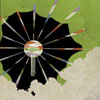 For this band to adopt the name Landing seems like a dash of irony.There is nothing grounded about this band, nothing the least bitindicative that they are or are about to touch the Earth and accept therules and mechanics that govern it. Their sound is one of the sublime,the surreal, more akin to the forces that invisibly hold things aloftand floating than the submission to gravity. "Fluency of Colors"initiates the album's upward motion, each note slipping over anotherand flickering darkly like a dying bulb burning after images intomemory. The music envelops, and what at first seems so delicate andvaporous begins to obscure everything else. Sphereis an album of meditation, of contemplative thought, using thehypnotic, patient bloom of the band's music to instigate a sense ofcalm and focus. Along the course of the album, there are threeinstrumental interludes, each titled "Gravitational." These interludesare the moment of greatest upheaval and dissonance on the album, pointswhere the urge to escape the pull results in stress and tension. Thethree pieces gradually build from the chilly wind-scape of the first tothe creaking buzz of the third. These pieces serve as weights orcounterpoints to the soaring jags the compromise the proper songs."Solstice" shimmers brightly while a stinging updraft of guitar searsthrough the temperate atmosphere. The intensity of the guitar's ascentis almost jarring in contrast to the lightness of the back drop,however the contrast heightens the perception of each elementindividually until ultimately they coalesce together perfectly. Thevery titles of the songs hint at a connection with perception,connection with the sights, sounds, and smells of the world around you.This thread of connection stretches itself between each song and bindstogether the album's experience, linking it to a greater application ofsense and feeling. Sphere would make an excellent album for sinking into thought, escaping the white noise of the mind.
For this band to adopt the name Landing seems like a dash of irony.There is nothing grounded about this band, nothing the least bitindicative that they are or are about to touch the Earth and accept therules and mechanics that govern it. Their sound is one of the sublime,the surreal, more akin to the forces that invisibly hold things aloftand floating than the submission to gravity. "Fluency of Colors"initiates the album's upward motion, each note slipping over anotherand flickering darkly like a dying bulb burning after images intomemory. The music envelops, and what at first seems so delicate andvaporous begins to obscure everything else. Sphereis an album of meditation, of contemplative thought, using thehypnotic, patient bloom of the band's music to instigate a sense ofcalm and focus. Along the course of the album, there are threeinstrumental interludes, each titled "Gravitational." These interludesare the moment of greatest upheaval and dissonance on the album, pointswhere the urge to escape the pull results in stress and tension. Thethree pieces gradually build from the chilly wind-scape of the first tothe creaking buzz of the third. These pieces serve as weights orcounterpoints to the soaring jags the compromise the proper songs."Solstice" shimmers brightly while a stinging updraft of guitar searsthrough the temperate atmosphere. The intensity of the guitar's ascentis almost jarring in contrast to the lightness of the back drop,however the contrast heightens the perception of each elementindividually until ultimately they coalesce together perfectly. Thevery titles of the songs hint at a connection with perception,connection with the sights, sounds, and smells of the world around you.This thread of connection stretches itself between each song and bindstogether the album's experience, linking it to a greater application ofsense and feeling. Sphere would make an excellent album for sinking into thought, escaping the white noise of the mind. Read More
- Administrator
- Albums and Singles
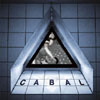 Though Chris Carter and Cosey Fanni Tutti have released a cartload ofalbums since 1981 under their familiar Chris & Cosey banner, Cabalis actually the debut album under their new guise of Carter Tutti. Thissudden switch from their sweetly alliterative Christian names to theirdecidedly more turgid surnames also signals a slight change of musicalstrategy. The music on Cabal is more abstract than past efforts, which were largely beat-driven and contained definite songs. Cabalis still very much recognizable as being the work of Chris and Cosey,with its deep technoid beat constructions and the breathy sexuality ofCosey's vocals, but there is a growing de-emphasis on song structure,and a clear move towards more amorphous and ambient soundscapes.Appropriate to its title, the album seems to exist in a nebuloussubterranean chamber, the musicians swimming lithe and eel-like in somekind of amniotic fluid, sending electrical pulses back and forth inwordless communication. I was immediately reminded of other aquaticallyfixated techno, such as that of the now-defunct Drexciya, or some ofThe Orb's more cohesive efforts. But Carter Tutti's brand of techno isdeep and druggy, shivering and sexual, finding its shape along thesurfaces of the female body. The musicians seem to be equating thesecret intrigue of the title with the labial folds or the dark recessesof the vagina, rising and falling with the rhythms of sexual congress.Dreamlike reverberations are sent careening into the deep echo chamberof each dubby bass rumble. Each track seems to melt into the next,forming one long continuous shape, kept in constant motion byrelentless snaking beat constructions. Each track is thoroughlydrenched in this muted, soft-edged aquatic atmosphere, the occasionalblasts of horn blowing bubbles in the murky depths. Much of the albumis suitably hypnotic, and the nebulous, undefined quality of many ofthe tracks helps to create this trancelike atmosphere. As the albumprogresses towards its conclusion, the tracks become ever more deeper,the frequencies lowering, providing a true test of a sound system'sability to handle rumbling, subterranean bass. The production istop-notch throughout, with each element crisply rendered and coastingacross the stereo channels, providing an immersive psychedelicenvironment that never failed to be complete engaging, sinking intolower and lower depths of hidden underwater chambers. My favoritemoment came on "Passing," when the sudden sad intonations of a droningharmonica provided an indescribably beautiful counterpoint to theheaving bass rumbles and Cosey's manipulated vocal cooing. Cabal is quite possibly the sexiest album I've heard all year.
Though Chris Carter and Cosey Fanni Tutti have released a cartload ofalbums since 1981 under their familiar Chris & Cosey banner, Cabalis actually the debut album under their new guise of Carter Tutti. Thissudden switch from their sweetly alliterative Christian names to theirdecidedly more turgid surnames also signals a slight change of musicalstrategy. The music on Cabal is more abstract than past efforts, which were largely beat-driven and contained definite songs. Cabalis still very much recognizable as being the work of Chris and Cosey,with its deep technoid beat constructions and the breathy sexuality ofCosey's vocals, but there is a growing de-emphasis on song structure,and a clear move towards more amorphous and ambient soundscapes.Appropriate to its title, the album seems to exist in a nebuloussubterranean chamber, the musicians swimming lithe and eel-like in somekind of amniotic fluid, sending electrical pulses back and forth inwordless communication. I was immediately reminded of other aquaticallyfixated techno, such as that of the now-defunct Drexciya, or some ofThe Orb's more cohesive efforts. But Carter Tutti's brand of techno isdeep and druggy, shivering and sexual, finding its shape along thesurfaces of the female body. The musicians seem to be equating thesecret intrigue of the title with the labial folds or the dark recessesof the vagina, rising and falling with the rhythms of sexual congress.Dreamlike reverberations are sent careening into the deep echo chamberof each dubby bass rumble. Each track seems to melt into the next,forming one long continuous shape, kept in constant motion byrelentless snaking beat constructions. Each track is thoroughlydrenched in this muted, soft-edged aquatic atmosphere, the occasionalblasts of horn blowing bubbles in the murky depths. Much of the albumis suitably hypnotic, and the nebulous, undefined quality of many ofthe tracks helps to create this trancelike atmosphere. As the albumprogresses towards its conclusion, the tracks become ever more deeper,the frequencies lowering, providing a true test of a sound system'sability to handle rumbling, subterranean bass. The production istop-notch throughout, with each element crisply rendered and coastingacross the stereo channels, providing an immersive psychedelicenvironment that never failed to be complete engaging, sinking intolower and lower depths of hidden underwater chambers. My favoritemoment came on "Passing," when the sudden sad intonations of a droningharmonica provided an indescribably beautiful counterpoint to theheaving bass rumbles and Cosey's manipulated vocal cooing. Cabal is quite possibly the sexiest album I've heard all year. Read More
- Administrator
- Albums and Singles
 Anything that can remotely resemble widespread commercial success escaped the Frames for most of their career when their last album, Set List, broke into the Top Ten in their native Ireland. Almost a year later, it was released on these shores as the first album in a new deal with Anti, garnering the band more attention in America as a band to watch intently. Their newest album was released in Ireland several weeks ago, and Anti will release it in the US and Europe in February. Until then, rabid fans can order through select dealers linked on the band's website to absorb the finest work in the band's decade-plus lifespan, as well as their most coordinated and complete effort to date.Plateau Records/ Anti
Anything that can remotely resemble widespread commercial success escaped the Frames for most of their career when their last album, Set List, broke into the Top Ten in their native Ireland. Almost a year later, it was released on these shores as the first album in a new deal with Anti, garnering the band more attention in America as a band to watch intently. Their newest album was released in Ireland several weeks ago, and Anti will release it in the US and Europe in February. Until then, rabid fans can order through select dealers linked on the band's website to absorb the finest work in the band's decade-plus lifespan, as well as their most coordinated and complete effort to date.Plateau Records/ Anti
Glen Hansard has grown by leaps and bounds as a songwriter in recent years, and the arrangements have slowly become more direct and openly ferocious than before, switching energy level on a dime and going full tilt before slowing for nigh-breathtaking moments of solemnity. In that regard he's found his voice two-fold, as subject matter turns from an argument that spawned a fight ("Happy") to relationship issues ("Fake," Finally"). At every turn, Hansard bears the potential to unleash into full-voiced howl, but he contains it for just the right moment each time, and sometimes opts for the more respectful and pretty falsetto. Meanwhile, the ensemble is beset with fine musicians who create an ebb and flow even in the hastiest of tempos, the highlight of which is the dissolution of "Dream Awake," where the drums approach the essence of breakbeat, the bass thumps with flurry, and guitar bends soar over it all until the violin takes its lead and betters it. To couple this with words like "For every time I came home screaming and got sent away with no warmth at all" creates the complete package that holds together under any scrutiny. The recording is the most faithful to the vibrant live shows the Frames are reknowned for, courtesy of new member Rob Bochnik and former member David Odlum, and the proper settings like Electrical Audio and Black Box Studios. Altogether, this set pulls back the curtain on their recorded output, revealing the Frames as the most vital band to come out of Ireland in twenty years at least, and maybe the most poetic that ever came from hence. It might just be their time, finally, to get the recognition they so richly deserve. 
Read More
- Administrator
- Albums and Singles
 Atmospheric tones have always been the trademark of Climax GoldenTwins, and on their latest release the group, who make little effort toidentify themselves beyond their collective name, moves into the moreintimate side of their range. Maybe scoring the feature film Session Ninehad an affect on the band, as the film features one character listeningto old recordings of psychological evaluations; these songs are createdaround acoustic guitars primarily and interwoven with sampledrecordings from over sixty years ago. These samples can be gloriouslysimple, from a conversation to narrative storytelling, or a fathertalking to a child, and when paired with the Twins music andmanipulation they take on a whole new life beyond their quaintbeginnings. Even though the music is quieter and sweeter than otherreleases, there's still an undercurrent of darkness, or maybe just atwinge of mortality here and there. Ominous feelings appear on selectsongs, like the voice at the end of "Every Word in the Bible" or thechild's voice on "Billy McGee McGaw," but these sometimes seemunintentionally so, and the music just seems to fit wherever andwhatever happens. Occasionally, though, like on "Little Noreen," themusic sets the scenario, and in these cases it's almost always asinister undertone. Sparseness is a key element all over, with songsnot extending into grandiose affairs or snarls of noise, just speakingtheir minds with as little words as possible. The album's second trackis the keynote speaker in that regard: called "Upright," the song is avery simple melody played on an upright piano with brushed cymbals, thevery "trick of singularity" as Shakespeare put it. There's littlevocals besides the scratchy recordings, but when there are ("Solid GoldMicrophone," for instance) they fit perfectly, and it's as though it'sa cover of a golden oldie just discovered in grandma's collection,brought forth and updated for the new ears of today. Maybe that's thekey: using technology of today to make songs that could fit somewherelost in time; and that's always seemed to be this group's specialty,never as fully realized until now.
Atmospheric tones have always been the trademark of Climax GoldenTwins, and on their latest release the group, who make little effort toidentify themselves beyond their collective name, moves into the moreintimate side of their range. Maybe scoring the feature film Session Ninehad an affect on the band, as the film features one character listeningto old recordings of psychological evaluations; these songs are createdaround acoustic guitars primarily and interwoven with sampledrecordings from over sixty years ago. These samples can be gloriouslysimple, from a conversation to narrative storytelling, or a fathertalking to a child, and when paired with the Twins music andmanipulation they take on a whole new life beyond their quaintbeginnings. Even though the music is quieter and sweeter than otherreleases, there's still an undercurrent of darkness, or maybe just atwinge of mortality here and there. Ominous feelings appear on selectsongs, like the voice at the end of "Every Word in the Bible" or thechild's voice on "Billy McGee McGaw," but these sometimes seemunintentionally so, and the music just seems to fit wherever andwhatever happens. Occasionally, though, like on "Little Noreen," themusic sets the scenario, and in these cases it's almost always asinister undertone. Sparseness is a key element all over, with songsnot extending into grandiose affairs or snarls of noise, just speakingtheir minds with as little words as possible. The album's second trackis the keynote speaker in that regard: called "Upright," the song is avery simple melody played on an upright piano with brushed cymbals, thevery "trick of singularity" as Shakespeare put it. There's littlevocals besides the scratchy recordings, but when there are ("Solid GoldMicrophone," for instance) they fit perfectly, and it's as though it'sa cover of a golden oldie just discovered in grandma's collection,brought forth and updated for the new ears of today. Maybe that's thekey: using technology of today to make songs that could fit somewherelost in time; and that's always seemed to be this group's specialty,never as fully realized until now. Read More

